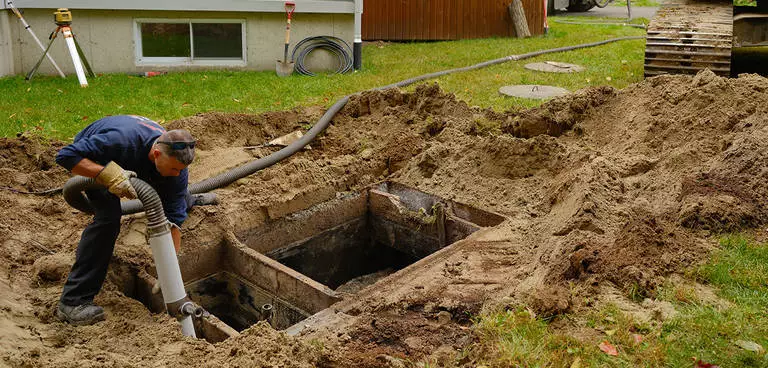Key Takeaways
- Regular maintenance prevents costly septic system repairs.
- Avoid flushing harmful materials to protect your septic system.
- Be mindful of water usage to prolong system life.
- Professional inspections are crucial for early problem detection.
Why Regular Maintenance Is Crucial
Maintaining your septic system properly requires routine maintenance. Skipping scheduled maintenance can lead to septic system repair and costly repairs. Like any other home system, septic tanks need routine care to run smoothly. Keeping a maintenance schedule ensures that your system runs efficiently and lasts longer.
According to the EPA, an untreated septic system can be a source of health hazards and environmental issues. Groundwater, which is an essential supply of drinking water for many communities, can be contaminated by poorly managed systems. Therefore, adhering to a regular maintenance routine not only preserves your septic system but also safeguards your health and the environment.
Materials to Avoid Flushing
Flushing certain materials down the drain can cause serious damage to your septic system. Items like wet wipes, grease, and chemicals are notorious for clogging pipes and disrupting the treatment process. These materials don’t break down easily and can lead to blockages that are expensive to fix. To ensure the smooth operation of your system, always remember to flush only human waste and toilet paper.
Other items to avoid include sanitary products, paper towels, cigarette butts, and household chemicals. These can not only clog your septic system but also kill the beneficial bacteria that help digest and treat the waste. Keeping harmful materials out of your septic system ensures that the bacteria remain functional and effective in breaking down waste.
Managing Your Water Usage
Overloading your septic system with water can cause it to fail prematurely. This can be especially problematic in homes that use a lot of water, like those that use dishwashers and washing machines on a regular basis. Spread out your laundry loads and fix leaky faucets to reduce unnecessary water consumption. Efficient water usage helps maintain the delicate balance within the system, preventing overflow and other water-related issues.
Practical Tips for Water Management
- Install water-saving fixtures like low-flow showerheads and dual-flush toilets.
- Fix leaks promptly to avoid accumulating unnecessary water in the system.
- Use efficient washing machines and dishwashers to minimize water use during each cycle.
- Use water wisely by turning off the faucet while brushing your teeth and taking shorter showers.
You may greatly extend the life of your septic system and maintain its optimal operation by implementing these small changes. Conserving water not only benefits your septic system but also reduces your overall water bill, making it a win-win situation for both your household and the environment.
The Importance of Professional Inspections
Expert inspections assist in spotting possible concerns before they develop into more significant ones. Experts recommend having your septic system inspected at least every three years to ensure everything is working correctly. These inspections can identify early signs of problems, such as leaks or blockages, allowing for timely interventions and avoiding major repairs.
Moreover, these experts can offer personalized advice tailored to your specific system and usage patterns, adding an extra layer of preventive care to your septic system maintenance. Inspections are especially important in older systems or those that have not had regular maintenance in the past. You may save a ton of time, money, and trouble later on by identifying issues early on.
DIY Tips for Septic System Care
- Use septic-safe household cleaners to avoid killing beneficial bacteria. These specialty cleansers are made to accomplish the same results while being kind to your septic system.
- Install a septic system effluent filter to catch solids before they reach the drain field. This can prevent clogs and overflow, helping to protect your system from damage.
- Divert rainwater away from the drain field by ensuring your gutters and downspouts are directed away from the septic area. This prevents the drain field from becoming waterlogged, which can inhibit its ability to absorb and treat waste.
- To prevent backups and overflows, empty the septic tank on a regular basis. The frequency of pumping should be determined by the size of your home and septic system, although most experts advise doing so every three to five years.
With the help of these do-it-yourself recommendations, you can keep your septic system maintained and in good operating order in between expert visits. Proactively managing the upkeep of your septic system can stop small problems from growing larger and more expensive.
Common Septic System Issues
Understanding common septic system issues can help you spot problems early and take corrective action. Some typical signs of failure include slow drains, unpleasant odors, standing water around the drain field, and gurgling sounds in plumbing. These symptoms often indicate that your system is under stress and needs attention.
Slow drains can signify a clogged pipe or a full septic tank. Unpleasant odors may suggest that waste is not being processed properly, possibly due to a lack of beneficial bacteria or a malfunctioning component. There could be major health and environmental risks if your system is overloaded, which is evident by the presence of standing water near the drain field. Gurgling sounds in the plumbing could be a sign of a blockage or other problem, causing air to become trapped in the pipes. If you notice any of these symptoms, you must promptly call a professional to diagnose and fix the problem.
Early detection can save you from more extensive and costlier repairs down the line. Addressing these issues as soon as they arise helps maintain your septic system’s efficiency and longevity.
Helpful Resources and Further Reading
For more in-depth information on maintaining your septic system, consider checking out the Natural Resources Defense Council’s guide on septic systems. Their comprehensive guide covers everything from the basics of how septic systems work to advanced tips for maintenance and troubleshooting.
Additionally, the Washington Post provides insights on how climate change affects septic systems. This article explores how changing weather patterns and rising temperatures can impact the performance and reliability of septic systems, offering valuable information for homeowners looking to future-proof their waste management systems.





